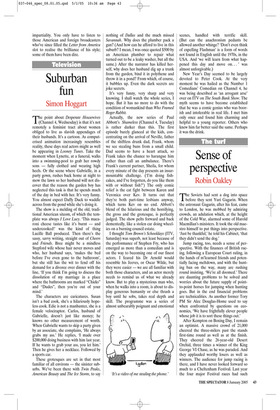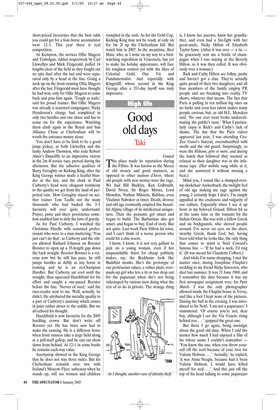Sense of perspective
Robin Oakley
The Soviets had sent a dog into space before they sent Yuri Gagarin. When the astronaut Gagarin, after his feat, came to London, he was mobbed by admiring crowds, an adulation which, at the height of the Cold War, alarmed some of Harold Macmillan’s ministers. It took the old maestro himself to put things into perspective. ‘Just be thankful,’ he told his Cabinet, ‘that they didn’t send the dog.’ Jump racing, too, needs a sense of perspective. With the finances of British racing, following a European Court ruling, in the hands of m’learned friends and potentially facing meltdown, and with the hunting ban on the way, many are rushing round insisting, ‘We’re all doomed.’ There are daunting problems to be solved and worries about the future supply of pointto-point horses for jumping when hunting goes. But in the end financial problems are technicalities. As another former Tory PM Sir Alec Douglas-Home used to say when confronted by questions on economics, ‘We have frightfully clever people whose job it is to sort these things out.’ After Kempton on Boxing Day, I remain an optimist. A massive crowd of 21,000 cheered the three-milers past the stands first-time round as well as at the finish. They cheered the 26-year-old Desert Orchid, three times a winner of the King George VI Chase, as he was paraded. And they applauded worthy losers as well as winners. The audience for jump racing is there, and I have never looked forward so much to a Cheltenham Festival. Last year the four major Festival races had such short-priced favourites that the best odds you could get for a four-horse accumulator were 12–1. This year there is real competition.
At Kempton, the novices Ollie Magern and Trabolgan, ridden respectively by Carl Llewellyn and Mick Fitzgerald, pulled 14 lengths clear of the field as they fought out an epic duel after the last and were separated only by a head at the line. Going a neck up on the front-running Ollie Magern after the last, Fitzgerald must have thought he had won, only for Ollie Magern to come back and pass him again. ‘Tough as nails,’ said his proud trainer. But Ollie Magern was already a seasoned campaigner; Nicky Henderson’s charge had completed in only two hurdles and one chase and has to come on for the experience. Watching them clash again in the Royal and Sun Alliance Chase at Cheltenham will be worth the entrance money alone.
You don’t have to be Irish to be a good jump jockey, as both Llewellyn and the lanky Andrew Thornton, who rode Robert Alner’s Duncliffe to an impressive victory in the 2m 4f novice race, proved during the afternoon. But the adhesive qualities of Barry Geraghty on Kicking King, after the King George winner made a fearful blunder at the last, and the clock in Paul Carberry’s head were eloquent testimony to the quality we get from the land of perpetual rain. How Geraghty stayed on neither trainer Tom Taaffe nor the many thousands who had backed the 3–1 favourite will ever quite understand. Prayer, poise and sheer persistence somehow enabled him to defy the laws of gravity.
As for Paul Carberry, I watched the Christmas Hurdle with seasoned professionals who were to a man muttering, ‘You just can’t do that’, as Carberry and the others allowed Richard Johnson on Rooster Booster to open up a 35-length gap down the back straight. Rooster Booster is a veteran now but he still has pace, he still jumps hurdles as deftly as any horse in training and he is an ex-Champion Hurdler. But Carberry sat cool until the straight, then squeezed Harchibald for his effort and caught a one-paced Rooster before the line. ‘Nerves of steel,’ said the race-reader next to me. Well, actually, he didn’t. He attributed the metallic quality to a part of Carberry’s anatomy which comes in pairs rather closer to the saddle. But we all echoed his thought.
Harchibald is now favourite for the 2005 hurdling crown. But don’t write off Rooster yet. He has twice now had to make the running. He is a different horse when front runners take a large field along at a pell-mell gallop, and he can cut them down from behind. At 12–1 in some books he remains each-way value.
Azertyuiop showed in the King George that he does not stay three miles. But his Cheltenham rematch over two with Ireland’s Moscow Flyer, unbeaten when he stands up, will see women and children trampled in the rush. As for the Gold Cup, Kicking King may not be ready at only six for 3m 2f up the Cheltenham hill. But watch him in 2007. In the meantime, Best Mate, who, as I write on my way to a birdwatching expedition in Venezuela, has yet to make his holiday appearance, will face his toughest contest yet with the likes of Celestial Gold, Our Vic and Fundamentalist. And especially with Kingscliff, whose second in the King George after a 351-day layoff was truly impressive.











































 Previous page
Previous page